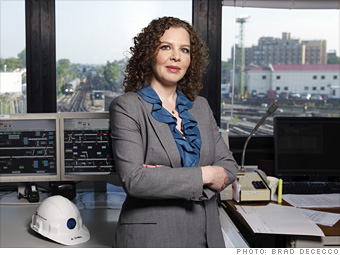There was recent news on system engineers being the best job in America.
1. Systems Engineer
Anne O'Neil, a chief systems engineer at the N.Y.C. Transit Authority, is one of five female senior managers in a department of 1,500.
Top 50 rank: 1
Sector: Information TechnologyWhat they do: They're the "big think" managers on large, complex projects, from major transportation networks to military defense programs. They figure out the technical specifications required and coordinate the efforts of lower-level engineers working on specific aspects of the project.
Why it's great: Demand is soaring for systems engineers, as what was once a niche job in the aerospace and defense industries becomes commonplace among a diverse and expanding universe of employers, from medical device makers to corporations like Xerox and BMW.
CNet News wrote as well.
Systems engineer deemed best job in America
If you're a systems engineer who wonders whether you've chosen the right profession, I bring you good news.
But, what got me write a blog entry was Google's job post for Data Center system engineer.
The role: Data Center Control Systems Engineer
Data Center Control Systems Engineers possess demonstrated design, operation, and construction experience in the areas of complex and mission critical facilities. You will have extensive knowledge of large-scale facilities controls and monitoring systems for all infrastructural systems.
As the Data Center Control Systems Engineer, you have excellent communication skills and are able to work in teams and matrix organizations. You are expected to develop and maintain strong functional relationships across multidisciplinary teams to anticipate future controls and monitoring design requirements. You will be continuously involved in the improvement of plant performance based on historical data collected and collaborate on retrofit projects to improve plant efficiency based on business case justifications.
and on top of that there is a Data Center Strategic Negotiator job which fits as a business/technical person to work with the system engineer.
The role: Data Center Strategic Negotiator
As a Data Center Strategic Negotiator,you will lead a team to collect and analyze large sets of location data, execute extensive on-the-ground due diligence, and to ultimately lead negotiations in to develop comprehensive legal contracts for data centers, real estate, power, and networking services around the world, for both new and existing assets, of all sizes. You must have substantial knowledge of global markets, in-depth technical expertise, and strategic analytical skills, in addition to rock-solid negotiation and collaboration capabilities. All location strategy and site selection initiatives are team efforts spearheaded by the Global Infrastructure Group (“GIG”). You will need to be a flexible, proactive team player who understands and seeks to support the larger strategic initiatives of the company. You are a proven professional with a track record that matches our philosophy of leading by innovation, who has a detailed understanding of both the technological and the commercial sides of data centers, and who has the ability to deliver against aggressive deadlines with a driving passion for cost reduction and highly effective solutions.
The Data Center Strategic Negotiator will carry out the selection and negotiations process for new data centers from start to finish. You will have experience designing and executing large-scale international site selection initiatives; deep and broad transactional knowledge; strong technical negotiation skills in the areas of data centers; real estate leases, purchase agreements, and entitlements; energy and other utilities; telecommunications; and economic development incentives. Technical knowledge and experience negotiating collocation space, racks, power circuits, cross connects and remote hands in conventional data centers is preferred. You will be adept at strategizing, structuring, negotiating, and closing a range of mission critical transactions in diverse settings and with diverse parties.
I spent more time going through the Google job postings for Mtn View. Google is building teams I was used to working with at Apple developing hardware. But, Apple didn't have the system engineers above as data centers back when I worked there were just for enterprise applications.
It will be hard to discover what Google's data center system engineer and strategic negotiator do, but keep in mind, they are developing systems for the way Google operates as a business. Copying their actions could cause more problems than they solve unless you think of the whole system.
It is great to see that Google has reached a stage in maturity to identify system engineering and holistic system negotiation as keys to their continue growth and cost reduction. On the other hand the job for these people would have been much easier if they were hired 10 years ago as they now need to work with the momentum of dozens of groups who are entrenched.
The biggest challenge to doing the jobs above is whether you have the organizational skills to instill change in groups.
My next read is Switch.
• Buy Switch.
• Come see us on the book tour.
• Read the first chapter.
Why is it so hard to make lasting changes in our companies, in our communities, and in our own lives?
The primary obstacle is a conflict that’s built into our brains, say Chip and Dan Heath, authors of the critically acclaimed bestseller Made to Stick. Psychologists have discovered that our minds are ruled by two different systems—the rational mind and the emotional mind—that compete for control. The rational mind wants a great beach body; the emotional mind wants that Oreo cookie. The rational mind wants to change something at work; the emotional mind loves the comfort of the existing routine. This tension can doom a change effort—but if it is overcome, change can come quickly.

